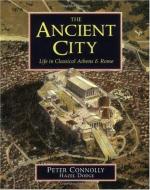
|
| Name: _________________________ | Period: ___________________ |
This test consists of 15 multiple choice questions and 5 short answer questions.
Multiple Choice Questions
1. Augustus focuses on creating this form of government.
(a) Communist.
(b) Autocratic.
(c) Republican.
(d) Democratic.
2. If found guilty of adultery, the wife and her lover suffer this.
(a) Killed.
(b) Banished to different locations.
(c) Exiled.
(d) Put into prison.
3. These, built in 312 BC, provide a reliable source of water for Romans.
(a) Sewage plants.
(b) Aqueducts.
(c) Water towers.
(d) Wells.
4. The stage of the Theater of Marcellus is _________.
(a) Simple.
(b) Complex.
(c) Missing.
(d) Uniform.
5. This garment symbolizes a young man's status as a full citizen.
(a) Toga of reality.
(b) Toga of citizenship.
(c) Toga of thought.
(d) Toga of manhood.
6. Women are penalized if they are not married by this age.
(a) Thirteen.
(b) Twenty.
(c) Thirty.
(d) Eighteen.
7. Travelers do not travel at night because of these.
(a) Curfews.
(b) Wild animals.
(c) Rats.
(d) Muggers.
8. The Forum Boarium was used to do this.
(a) Sell food.
(b) Sell houses.
(c) Sell jewelry.
(d) Sell livestock.
9. The comedies that have an effect on later Roman comedy are the _____ and the ______.
(a) Campanian farce and Phylakes.
(b) Campanian farce and the mime.
(c) Phlyakes and the Atellan farce.
(d) Phylakes and the Mime.
10. Actors are often _____.
(a) Children.
(b) Women.
(c) Slaves.
(d) Foreigners.
11. Caligula is assassinated, along with these individuals.
(a) His wife and daughter.
(b) His son and daughter.
(c) His mother and daughter.
(d) His mother and wife.
12. By the first century BC, theater is geared toward this.
(a) War.
(b) Public taste.
(c) Political satire.
(d) Humor.
13. This is the most famous Roman drain.
(a) Tiberus Minima.
(b) Tiberus Maxima.
(c) Cloaca Maxima.
(d) Cloaca Minima.
14. Roman literature indicates this is widespread.
(a) Famine.
(b) Adultery.
(c) Poverty.
(d) Disease.
15. The Hellenised Egyptian goddess ____ also has a cult in Rome.
(a) Mithras.
(b) Isis.
(c) Era.
(d) Gelda.
Short Answer Questions
1. The four Pompeian styles include the Masonry, large panels of color, scenery, and this.
2. There are _______ starting gates in the circus.
3. Limestone, brick, and this are standard building materials.
4. Hairstyles of women vary according to this.
5. These establishments cater to a quick drink or longer refreshments.
|
This section contains 329 words (approx. 2 pages at 300 words per page) |

|




